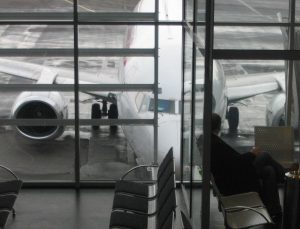Trump Travel Ban: A Necessary Evil
By Paula Hernandez

On Sept. 24, President Donald Trump released a proclamation expanding travel restrictions to seven new countries (Chad, Iran, Libya, North Korea, Syria, Venezuela and Yemen). The new ban, unlike its 90-day predecessor, will be a permanent fixture beginning mid-October.
I will not discuss the morality of the travel ban; I have found that only rarely does one’s opinions on these types of issues actually change and I refuse to add another ranting voice to the chaotic void of American politics. What I will discuss is the importance of Trump’s addition of two specific countries to the ban: North Korea and Venezuela. The inclusion of these two countries is as much a symbolic declaration that the U.S. stands firmly against the political and moral ideologies of these nations as it is a tactical move to protect American citizens and their interests.
This new ban plays dual roles as a method of defending the safety of American citizens and also as a declaration that the U.S., under Trump’s administration, will not stand for the atrocities against human rights happening in Venezuela and North Korea. It is a signal to the world that we are willing to use official means, not just slurs and tweets, to combat any policies that are a threat to human rights and American civilians. This leads to the question of the value and practicality of this symbolism.
Objectively, the two points the proclamation makes on North Korea, that “North Korea does not cooperate with the United States Government in any respect and fails to satisfy all information-sharing requirements,” and that “the entry into the United States of nationals of North Korea as immigrants and nonimmigrants is hereby suspended,” are not at all unreasonable. It is clear to any observer that North Korea is a wildcard in the game of global politics and that their refusal to communicate diplomatically is a threat not only to the U.S., but also to every country in the world, especially given the country’s anti-American rhetoric and aggressive nuclear development program. I would even argue that this declaration could be an essential diplomatic check mark before engaging in military action against North Korea.
This new ban has neither significantly helped nor hurt our relationship with North Korea, but now, with a tangible document to clearly reinforce the United States’ position that it will only negotiate with North Korea on its own terms, the Trump administration clearly establishes its willingness to take a stand against enemy nations and make the difficult choices.
The terms of the ban for Venezuela, unlike those for North Korea, are primarily for government officials. The rescission of the visas of a select group of government officials conveys an ideological difference between our two nations. Rather than punishing the starving and suffering civilians of Venezuela, the attack is directly on officials who “are responsible for the identified inadequacies,” who I would argue are not only in refusal to cooperate on a level of national security, but also human decency. By including Venezuela, Trump makes a moral decision that establishes American exceptionalism. Right or wrong, Trump is clearly stating that the United States’ system of government is right and the Venezuelan system of government is wrong. Considering the dire situation the people of Venezuela find themselves in and its underlying cause, I have to agree.
Donald Trump is no stranger to bold statements. Every other news story is about his controversial Twitter account. A true reality TV star, Trump’s goal is to remain in the limelight. As leader of the free world, he acts no differently, fighting to keep the U.S. as the global superpower. Through this new travel ban, he is not only giving his constituents what he promised on the campaign trail, but he is also demonstrating that his will to stand against America’s enemies goes beyond a social platform frequented by 12-year-olds.
Paula Hernandez Garaycoa, FCRH ’21, is an English major from Miami, Florida.







































































































































































































